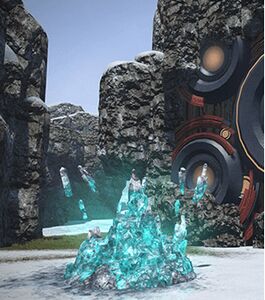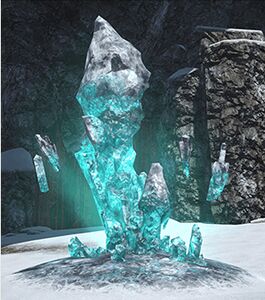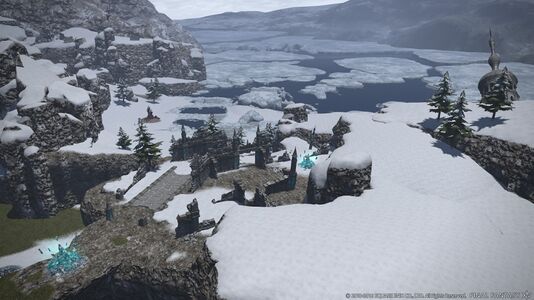Difference between revisions of "The Fields of Glory (Shatter)"
| (One intermediate revision by the same user not shown) | |||
| Line 27: | Line 27: | ||
Data is collected in two different methods: | Data is collected in two different methods: | ||
* Destroying Icebound Tomeliths | * Destroying Icebound Tomeliths (+1~200 data depending on icebound tomelith size and damage inflicted) | ||
* Defeating enemy players (+8 data) | * Defeating enemy players (+8 data) | ||
In the event that none of the three alliances manage to accumulate the requisite amount of data before time runs out, victory is awarded based on which alliance gathered the most data. | In the event that none of the three alliances manage to accumulate the requisite amount of data before time runs out, victory is awarded based on which alliance gathered the most data. | ||
In the event that two or more alliances reach 1,600 data obtained at the same time, the match will be declared a draw. | |||
==Icebound Tomeliths== | ==Icebound Tomeliths== | ||
| Line 41: | Line 43: | ||
==Activating Icebound Tomeliths== | ==Activating Icebound Tomeliths== | ||
Icebound tomeliths can only be destroyed once they have become active. They will be inactive at the start of the campaign, and after approximately 30 seconds have elapsed, | Icebound tomeliths (colloquially referred to as '''ice''') can only be destroyed once they have become active. They will be inactive at the start of the campaign, and after approximately 30 seconds have elapsed, two large icebound tomeliths will activate. Icebound tomeliths that have been destroyed will reactivate after a fixed period of time. Icebound tomeliths that are about to activate will have an outline around their icon on the map. | ||
As time passes, more icebound tomeliths will activate, and the order in which they do so differs in every campaign. However, in general, there will always be two large icebound tomeliths primed to activate. Small icebound tomeliths will always activate at '''12:30''' and '''4:30''' remaining on the timer. | |||
Regardless of the timing and frequency, all tomeliths on the map will have activated at least once by the end of the campaign. | |||
==Destroying Icebound Tomeliths== | ==Destroying Icebound Tomeliths== | ||
The data from icebound tomeliths can be collected by attacking them, and once they are destroyed, data will be rewarded to each alliance based on the amount of damage inflicted. These rewards max out at '''50''' for a small tomelith and ''' | The data from icebound tomeliths can be collected by attacking them, and once they are destroyed, data will be rewarded to each alliance based on the amount of damage inflicted. These rewards max out at '''50''' for a small tomelith and '''200''' for a large tomelith. Small tomeliths have '''300,000''' HP and large tomeliths have '''3,000,000''' HP. | ||
'''Battle High is critical for destroying icebound tomeliths'''. The faster that the tomeliths are destroyed, the more quickly score is earned, and victory will come faster. Therefore the successful Grand Company will place an equal, if not greater, importance on gaining Battle High. | |||
==Icebound Tomelith Positioning and Plays== | |||
Three of the four large icebound tomeliths are connected via a ramp to the left of a Grand Company's landing platform, and attempting to destroy another Grand Company's large icebound tomelith is an extremely risky strategy. Attacking from the middle field in particular is notoriously dangerous as it invites a flank (or "pinch") by the third Grand Company. Similarly, dropping down from the cliffs to the right of the landing platforms cuts off any chance of retreat by the attacking Grand Company and is a committal play usually best avoided. | |||
The middle large icebound tomelith is commonly the scene of the most intense fighting as it is freely accessible to all Grand Companies. | |||
==Images== | ==Images== | ||
Latest revision as of 18:29, 1 October 2024
The Fields of Glory (Shatter)
- Level
- 30
- Difficulty
- Normal
- Unsyncing
- Not Allowed
- Time limit
- 20 minutes
- Roulette
- Frontline
- Tomestones
 50
50 - Req. quest
 Like Civilized Men and Women
Like Civilized Men and Women- Patch
- 3.3
“Under the influence of the lesser moon Dalamud, Nael van Darnus, legatus of the VIIth Legion, sought out and unearthed Allagan ruins in the eastern lowlands of Coerthas. Aided by the knowledge contained therein, he raised the very earth unto the heavens, and from this lofty perch did the White Raven nearly orchestrate the destruction of Eorzea.
The remnants of that mad plan still litter the frozen lowlands, as well as other ancient artifacts now laid bare. Though the powers that be are in agreement that Nael's data must be secured, they remain divided on the subject of how best to administer the region, which has prompted them to invoke the same laws which transformed Carteneau and Seal Rock into a battlefield. Where words fail, weapons speak.
— In-game description
The Fields of Glory (Shatter) is a level 30 PvP duty introduced in patch 3.3 with Heavensward.
Victory Conditions
Similarly to Seal Rock, players must collect data from Allagan Tomeliths and obtain a set amount of 1,600 data in order to be declared the winner, with the remaining alliances being ranked based on the amount of data they collected.
Data is collected in two different methods:
- Destroying Icebound Tomeliths (+1~200 data depending on icebound tomelith size and damage inflicted)
- Defeating enemy players (+8 data)
In the event that none of the three alliances manage to accumulate the requisite amount of data before time runs out, victory is awarded based on which alliance gathered the most data.
In the event that two or more alliances reach 1,600 data obtained at the same time, the match will be declared a draw.
Icebound Tomeliths
Active icebound tomeliths will be either large or small, with large tomeliths containing more data.
Activating Icebound Tomeliths
Icebound tomeliths (colloquially referred to as ice) can only be destroyed once they have become active. They will be inactive at the start of the campaign, and after approximately 30 seconds have elapsed, two large icebound tomeliths will activate. Icebound tomeliths that have been destroyed will reactivate after a fixed period of time. Icebound tomeliths that are about to activate will have an outline around their icon on the map.
As time passes, more icebound tomeliths will activate, and the order in which they do so differs in every campaign. However, in general, there will always be two large icebound tomeliths primed to activate. Small icebound tomeliths will always activate at 12:30 and 4:30 remaining on the timer.
Regardless of the timing and frequency, all tomeliths on the map will have activated at least once by the end of the campaign.
Destroying Icebound Tomeliths
The data from icebound tomeliths can be collected by attacking them, and once they are destroyed, data will be rewarded to each alliance based on the amount of damage inflicted. These rewards max out at 50 for a small tomelith and 200 for a large tomelith. Small tomeliths have 300,000 HP and large tomeliths have 3,000,000 HP.
Battle High is critical for destroying icebound tomeliths. The faster that the tomeliths are destroyed, the more quickly score is earned, and victory will come faster. Therefore the successful Grand Company will place an equal, if not greater, importance on gaining Battle High.
Icebound Tomelith Positioning and Plays
Three of the four large icebound tomeliths are connected via a ramp to the left of a Grand Company's landing platform, and attempting to destroy another Grand Company's large icebound tomelith is an extremely risky strategy. Attacking from the middle field in particular is notoriously dangerous as it invites a flank (or "pinch") by the third Grand Company. Similarly, dropping down from the cliffs to the right of the landing platforms cuts off any chance of retreat by the attacking Grand Company and is a committal play usually best avoided.
The middle large icebound tomelith is commonly the scene of the most intense fighting as it is freely accessible to all Grand Companies.





